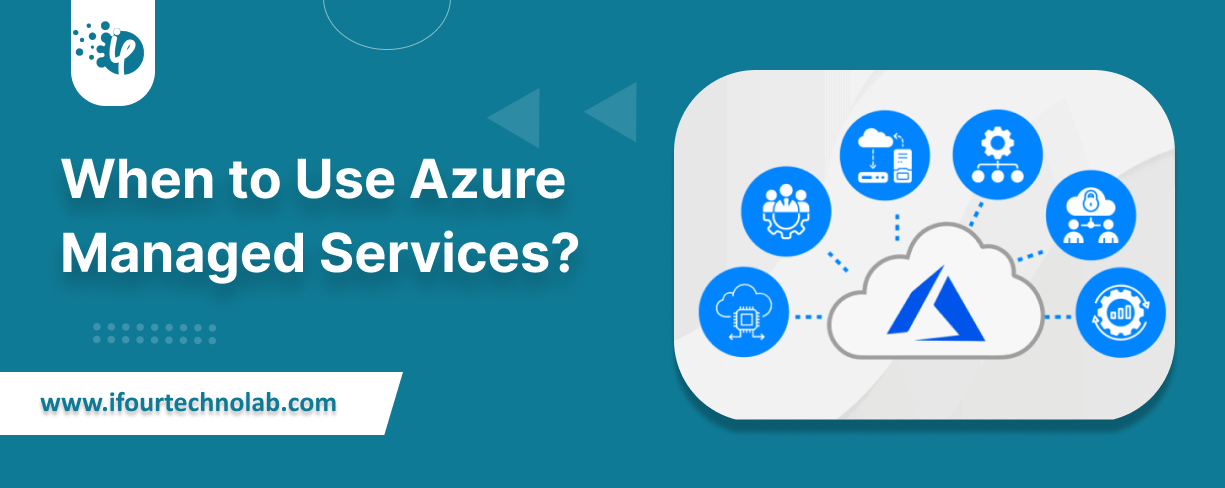How to Do Forecasting in Power BI (Steps & Accuracy Metrics)
Remember our last guide - Power BI forecasting? It revealed things that truly blocks accuracy, both structural and situational. Now it's time to take the next step. Knowing Power...
Listening is fun too.
Straighten your back and cherish with coffee - PLAY !

Azure Managed Services is a massive hub, and inside this, you've got everything from Virtual Machines, Azure SQL Databases, App Services, to Kubernetes, and even Azure Entra ID.
It’s packed!
But here’s the thing to understand — despite having access to all these powerful tools, knowing when to use what makes all the difference.
For this, you can ask yourself like:
- Do I need help managing Azure infrastructure?
- Do I need reliable database support?
- Is security top of mind?
- Or do I want my app to run smoother without problems?
So, knowing your scenario is the key.
Let’s delve further and explore the best possible scenarios for using Azure managed services.
Simplify database migration with our Azure DB Migration services
Azure cloud services are exceptional because of their advanced cloud infrastructure and features such as built-in monitoring and alerting. This is why big companies like Intel, and Walmart prefer it.
Given below are some of the critical scenarios where Azure cloud managed services should be used.
Let’s say you're running a growing software development company. Strategically, things are going great, you're landing new clients, and projects are rolling in. But your tech team has been swamped with juggling support tickets, keeping systems running, and still expected to innovate. That’s what happens when your business scales faster than your infrastructure.
Likewise, if you're expanding your cloud presence, adding new apps, services, users, but your team is stretched thin, it's time to consider Azure Managed Services.
It is like hiring a seasoned Azure cloud developer who knows exactly what to do, so your internal team can focus on crafting your core product.
Let’s connect and discuss how Azure Managed Services can help your business operate smarter, faster, and more securely.
Visualize your warehouse data in minutes with our Azure Synapse Analytics services
Let’s say your business is like an airport. You can’t just take off and land wherever you want—there are strict air traffic rules, baggage checks, and flight regulations. The same goes for industries like healthcare, finance, or legal—data compliance isn't optional.
If your business handles sensitive customer data, you’re likely bound by regulations like GDPR, HIPAA, ISO, or SOC 2. Falling short could mean hefty fines or damaged reputation.
Want to stay audit-ready with Azure managed support services? We can help you meet compliance standards without the complexity.
Ever gone grocery shopping hungry and without a list? You end up buying more than you need, and your bill shocks you at checkout. That’s how cloud expenses work when they’re unmanaged—convenient but surprisingly costly.
If you're struggling to forecast your monthly cloud bills or often pay for unused resources, you're not alone. Many companies face this financial fog.
Control your IT spend with our Azure cloud optimization services, designed to reduce surplus and maximize ROI.
Picture running a busy eCommerce store during Black Friday—and your website crashes. Every second of downtime feels like pouring water into a leaking bucket. You lose customers, sales, and trust.
If your business can't afford outages, even at midnight or during holidays, then relying solely on an in-house team may not be enough.
Avail our Azure consulting services to make your business efficient and available all the time.
Imagine you’ve inherited an old, classic car. You want to make it roadworthy, but you’re not sure which parts to upgrade or replace. Similarly, many businesses sit on legacy infrastructure and want to modernize, but don’t know where to start.
You may have on-prem systems, outdated applications, or fragmented data—and you’re aiming to transition to Azure smoothly.
Discuss your needs with iFour, a leading Microsoft Azure managed service provider and make your cloud journey flawless from day one.
Extend your data management with our MS Azure Arc Data Services
Remember those school projects where one friend did all the creative work and the others just cut charts and printed stuff? That’s what happens when your top tech minds are stuck handling backups or fixing server errors—they can't innovate.
If you want your team to focus on building better products or features, offloading routine cloud ops is the smartest move.
Get access to our Azure managed support services and handle the heavy lifting seamlessly.
Imagine you opened a small café and suddenly went viral on social media. If you don’t expand quickly - more tables, more staff—you’ll end up turning customers away.
Similarly, when your product takes off, your infrastructure needs to scale—fast and without friction.
Prepare your enterprise for future growth using Azure infrastructure management.
Working in healthcare, finance, or legal software development services? Then you already know the pressure of compliance. Even after making things right, you need to keep yourself extra cautious on complying industry standards.
Microsoft Azure cloud is known for strong security. When you adopt Azure Managed Services, you get peace of mind and effectively deal with heavy lifting and demanding regulatory needs.
It’s like hiring a legal advisor who works 24/7 to ensure you never step out of line.
Meet your industry demands effectively with our Azure services for enterprises. At iFour, we prioritise security, compliance, and process control.
Say you’ve just moved into a smart home but don’t know how to set up the devices. You need someone who understands the system inside out, at least until you're confident.
If you don’t have full-time Azure specialists, you’re likely underusing features or wasting money.
Guidance for Azure security best practices or patterns.
Explore Azure cloud managed services and bridge your enterprise gaps.
Streamline project deployment with our Azure CI/CD pipeline services
Managing multiple clouds is like trying to drive two cars at the same time - you might move forward, but it’s risky, confusing, and inefficient.
If you’re juggling between on-prem systems, Azure, and maybe AWS or Google Cloud, the complexity multiplies.
So, these are some of the key business scenarios that call for Azure Managed Services.
Simplify complexity with managed services on Azure. Unify your hybrid and multi-cloud operations right away with iFour.
Think of Azure Managed Services as your cloud co-pilot, steering the wheel when things get complex, and letting you focus on what matters most: growth, innovation, and customer success.
Here’s a quick recap of when you should consider Azure Cloud Managed Services:
In this blog, we discussed 15 Cloud Migration Best Practices – On premises to Azure cloud.
With Azure Managed Services, you stay focused on growth while the experts handle the rest—from infrastructure to security and everything in between.
Require Assistance in adopting Azure Cloud Managed Services? Contact iFour – a leading Azure Arc Data Services provider and get your requirements done.

Remember our last guide - Power BI forecasting? It revealed things that truly blocks accuracy, both structural and situational. Now it's time to take the next step. Knowing Power...

Security has always been a major concern. Your company spends millions on cybersecurity tools, and guess what? You’re still vulnerable. When you're working in the cloud, especially...

Automation isn’t just a trend anymore. It’s a must-have for any business relying on the Cloud. As the firm grows, cloud infrastructure gets more complex. So, choosing the right Infrastructure...